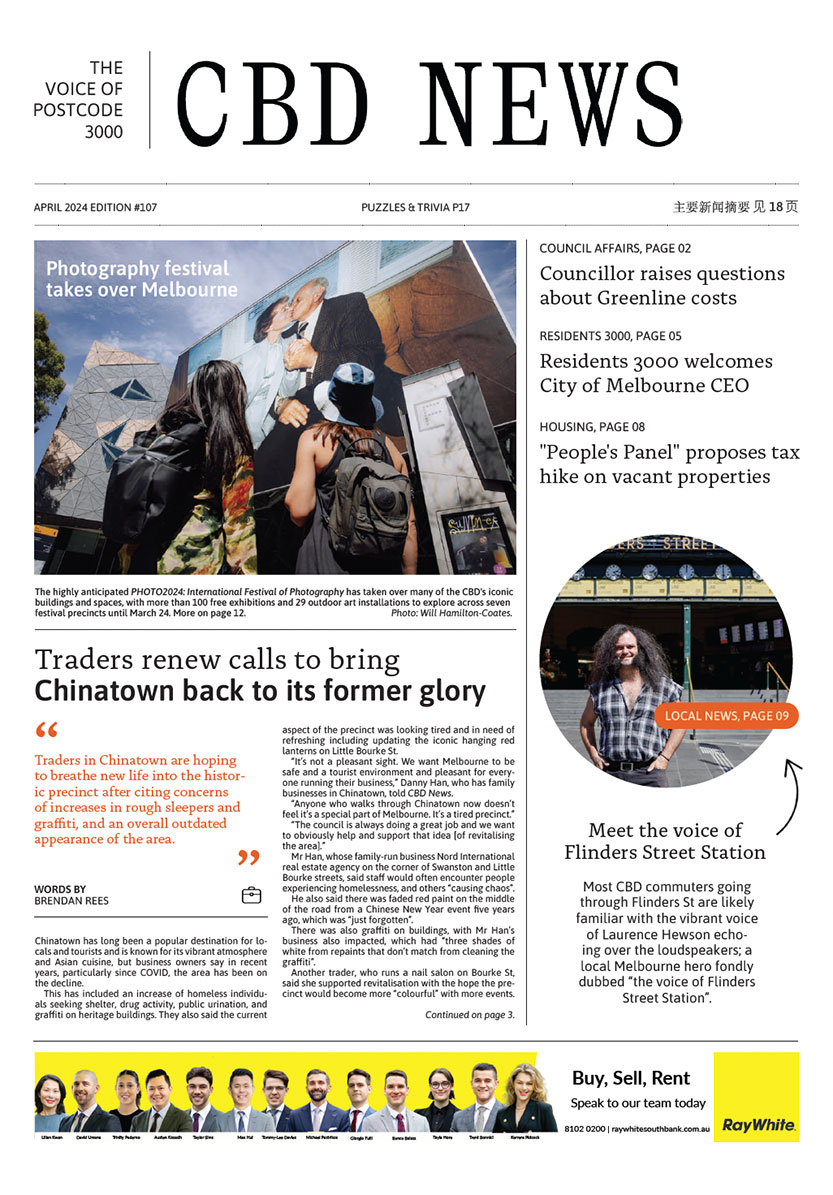City on pause amid uncertainty
By David Schout
As facilities close, workers clear and events cease, Melbourne is bracing for an acutely uncertain 2020 in the midst of the Coronavirus (COVID-19) pandemic.
In the space of just two weeks in March, almost all CBD-based businesses and events were forced to close or cancel after increasingly stringent government measures forced people indoors.
Many CBD residents now face the prospect of self-isolation inside apartment buildings and, for international students that make up a significant part of the population, a period of particular uncertainty as classes move online and casual work dries up.
There’s also significant uncertainty for the city’s most vulnerable, including hundreds of rough sleepers and couch surfers.
Increasingly stringent social distancing and isolation rules has made the job of the Salvation Army, Melbourne City Mission and Launch Housing particularly difficult, but they have bravely vowed to continue serving those most requiring assistance.
The impact on city-based businesses has been swift.
At first, the rapid downturn in foot traffic from both locals and visitors saw parts of the city usually teeming with life rendered to ghost towns in a short space of time.
Areas such as Bourke Street Mall traditionally see more than 3000 pedestrians pass through during the lunchtime period (12pm-1pm).
But by Monday, March 23 the council’s pedestrian sensors indicated this was down to just 1165 for the same period, a number expected to further drop throughout April and beyond.
It was at this exact time that all non-essential businesses, including pubs, clubs, gyms and cinemas were forced shut by the state government.
Some were uncertain whether their doors would open again.
Lord Mayor Sally Capp said the health and economic impacts on the city were profound.
“Of course, the priority has to be health and the way we respond to our challenge around slowing the spread of this virus,” she said in a social media address.
“Here in the city it has been devastating to see the impact on the number people (present) and what that means for our retailers and hospitality businesses in particular.”
Cr Capp said that people were “firmly at the centre” of the City of Melbourne’s approach in the coming weeks and months.
“It’s really important that we’re all taking a caring approach at this time. For us we’re particularly looking at our most vulnerable, being our elderly and rough sleepers. So please, whatever you’re doing, look out for the people around you whilst taking the necessary precautions for all of us to slow the advancement of this virus.”
All the city’s libraries, aquatic/recreation centres, arts and cultural centres, community hubs and visitor centres have been closed until further notice.
In the CBD, this included: City Library, Melbourne City Baths, Signal and ArtPlay.
At the time of publication, childcare facilities and in-home services such as domestic assistance, home maintenance, meals, personal care, respite, and individual social support would continue, as council staff were ordered to ask COVID-19 screening questions.
The Queen Victoria Market would remain open, as would services such as waste and recycling, building, planning, animal management, parking and traffic.
Of course, the state and federal government’s actions and response will most determine the health and economic impact of COVID-19 on locals.
But the council has made a number of moves to soften the blow.
Most notably, this included a $10 million pledge to cushion the impact on city businesses and workers, something small business chair Susan Riley said the a favourable financial position allowed them to do. For more on what the package included read How the virus has hit the CBD on page 1.
Deputy Mayor Aaron Wood said the council’s focus was on “rates and rent”, and relief would be swift.
“We’re acting quickly, it’s not all going to be perfect, but sometimes ‘perfect’ can get in the way of ‘good’, and that’s really why we’re moving as quickly as possible,” he said at the March 17 Future Melbourne Committee meeting.
Arts, Culture and Heritage chair Rohan Leppert fielded countless calls from event organisers cancelling events throughout the municipality, many of which employed hundreds of casual staff who have all lost work.
He said the council’s assistance was important, but should be put in context.
“I wish we were the Commonwealth and we could stimulate the local economy in a targeted way. But we’re not, we’re a municipal authority. We need to look at what we can do well.”
For updated local government advice on COVID-19, visit melbourne.vic.gov.au

Experts gather to discuss “city-shaping” Greenline project






 Download the Latest Edition
Download the Latest Edition